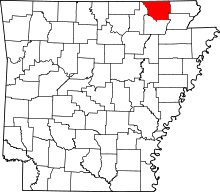Maynard, Arkansas
| Maynard, Arkansas | |
|---|---|
| Town | |
 Location in Randolph County and the state of Arkansas | |
| Coordinates: 36°25′6″N 90°54′8″W / 36.41833°N 90.90222°WCoordinates: 36°25′6″N 90°54′8″W / 36.41833°N 90.90222°W | |
| Country | United States |
| State | Arkansas |
| County | Randolph |
| Government | |
| • Mayor | Don Sikes |
| Area | |
| • Total | 7.4 sq mi (2.9 km2) |
| • Land | 1.1 sq mi (2.9 km2) |
| • Water | 0 sq mi (0 km2) |
| Elevation | 384 ft (117 m) |
| Population (2010) | |
| • Total | 426 |
| • Density | 346.4/sq mi (131.4/km2) |
| Time zone | Central (CST) (UTC-6) |
| • Summer (DST) | CDT (UTC-5) |
| ZIP code | 72444 |
| Area code(s) | 870 |
| FIPS code | 05-44780 |
| GNIS feature ID | 0077620 |
Maynard is a town in Randolph County, Arkansas, United States. The population was 426 at the 2010 census.
Maynard is home to the Maynard Pioneer Museum and Park. A jail built in 1936 has a door made of wagon wheel rims. The last time it was used was in 1988, when it temporarily housed a man charged with public intoxication. The jail is beside Maynard Community Center.
History
Maynard was settled in the late 19th century.
Abbott Institute — later known as Maynard Baptist Academy and Ouachita Baptist Academy — was a boarding school established in 1894. Abbott Institute joined a school network associated with a college now known as Ouachita Baptist University in Arkadelphia.[1]
The federal attorney Drew Bowers, a native of Pocahontas attended the academy in the mid-1890s before he transferred to the University of Arkansas at Fayetteville.
In 1928, Maynard Baptist Academy was sold to the Maynard School District. Its facilities were then used by the public school. All that remains of the academy today is an arch built by Maynard Baptist Academy's class of 1927, its last class. In 2008, Maynard School Alumni Association restored the arch on the school grounds as a memorial to the academy.[1]
In January 2011, Verizon, Inc. erected a cellular phone tower (CDMA/3G) on the outskirts of Maynard.
Geography
Maynard is located at 36°25′6″N 90°54′8″W / 36.41833°N 90.90222°W (36.418200, -90.902166).[2]
According to the United States Census Bureau, the town has a total area of 2.9 km² (1.1 mi²), all land.
List Of Highways
Demographics
| Historical population | |||
|---|---|---|---|
| Census | Pop. | %± | |
| 1900 | 358 | — | |
| 1910 | 295 | −17.6% | |
| 1920 | 210 | −28.8% | |
| 1930 | 259 | 23.3% | |
| 1940 | 266 | 2.7% | |
| 1950 | 216 | −18.8% | |
| 1960 | 201 | −6.9% | |
| 1970 | 224 | 11.4% | |
| 1980 | 381 | 70.1% | |
| 1990 | 354 | −7.1% | |
| 2000 | 381 | 7.6% | |
| 2010 | 426 | 11.8% | |
| Est. 2015 | 417 | [3] | −2.1% |
There were 175 households out of which 25.7% had children under the age of 18 living with them, 49.7% were married couples living together, 10.9% had a female householder with no husband present, and 37.1% were non-families. 33.7% of all households were made up of individuals and 17.1% had someone living alone who was 65 years of age or older. The average household size was 2.18 and the average family size was 2.78.
In the town the population was spread out with 24.1% under the age of 18, 8.7% from 18 to 24, 22.8% from 25 to 44, 22.0% from 45 to 64, and 22.3% who were 65 years of age or older. The median age was 40 years. For every 100 females there were 87.7 males. For every 100 females age 18 and over, there were 85.3 males.
The median income for a household in the town was $17,206, and the median income for a family was $23,056. Males had a median income of $20,625 versus $15,357 for females. The per capita income for the town was $11,668. About 14.8% of families and 27.0% of the population were below the poverty line, including 38.3% of those under age 18 and 18.3% of those age 65 or over.
Education
Public education for elementary and secondary school students is provided by the Maynard School District, which includes:
- Maynard Elementary School
- Maynard High School
The school mascot and athletic emblem is the Tiger with black and gold serving as the schools' colors.
Notable people
Notable individuals who were born in or have lived in Maynard:
- Jason Rapert — Arkansas state senator, attended Maynard public schools.
References
- 1 2 "Maynard Baptist Academy". Encyclopedia of Arkansas. October 2014. Retrieved January 26, 2016.
- ↑ "US Gazetteer files: 2010, 2000, and 1990". United States Census Bureau. 2011-02-12. Retrieved 2011-04-23.
- ↑ "Annual Estimates of the Resident Population for Incorporated Places: April 1, 2010 to July 1, 2015". Retrieved July 2, 2016.
- ↑ "Census of Population and Housing". Census.gov. Archived from the original on May 11, 2015. Retrieved June 4, 2015.
External links
- Maynard Pioneer Museum and Park - Maynard log cabin and history museum
- Maynard Baptist Academy
- Arkansas Department of Parks & Tourism: Maynard Pioneer Museum & Park
- Ozark Acres Weather
